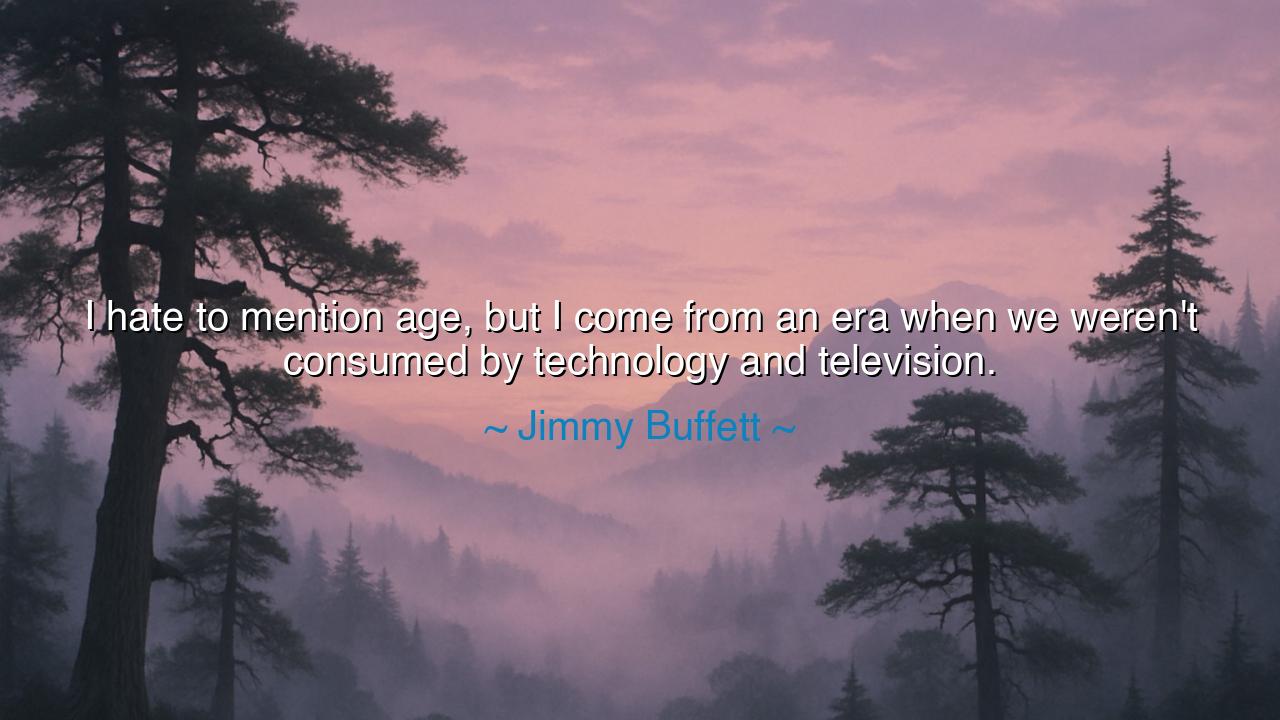
I hate to mention age, but I come from an era when we weren't
I hate to mention age, but I come from an era when we weren't consumed by technology and television.






In the vast unfolding of time, when the world was not yet consumed by the frenzied hum of technology and the glowing screens that seem to dominate our lives today, there existed a different kind of connection—a deeper bond between humans, nature, and the rhythms of life itself. Jimmy Buffett offers a reflection on this era with his words, "I hate to mention age, but I come from an era when we weren't consumed by technology and television." These words, though spoken with a hint of nostalgia, also carry a profound wisdom. They remind us of a time when human connection was more organic, when the pace of life was slower, and when our lives were not constantly dictated by the digital screens in front of us. In these words lies a subtle warning: the more we allow ourselves to be consumed by the external distractions of the modern world, the more we risk losing touch with the essence of life itself.
The ancients were well aware of the dangers of distraction. The philosopher Socrates, in his endless search for truth, believed in the importance of dialogue and the human mind’s capacity to think deeply without the distractions of the material world. He warned against the influence of those who would seek to divert attention away from the truth through empty pleasures or external forces. In many ways, technology and television serve as modern versions of this distraction, offering the illusion of connection while often pulling us away from the deep thinking and personal interactions that truly enrich our lives. Buffett’s reflection harks back to an age when the simple pleasures—conversation, nature, art, and music—held more weight than the instant gratification offered by a world consumed with images and noise.
Consider the lives of the great artists and thinkers of the past, whose works were born from quiet contemplation, personal experience, and intimate connections with the world around them. Take, for example, the great poet Homer, who, in the stillness of his time, crafted tales of gods and men that still resonate with us today. His epic works, such as the Iliad and the Odyssey, were not born from the clatter of technology or the rush of modern life, but from a deep understanding of the human condition and an ability to listen to the world. In his time, stories were passed down orally, shared by firelight, and spoken with care. In many ways, the world of Homer’s Greece is far removed from the digital age, where we often consume stories without reflection, without engagement, and without the deep connection that comes from shared experience.
Buffett’s words also remind us of the simplicity of an era where human relationships were nurtured in person, face to face, where the focus was on building community and understanding. Television and technology—though they bring us closer in some ways—often distance us from the richness of our surroundings. A time when people sat around a fire, shared meals, and communicated deeply, was a time that fostered true human connection. Modern life, by contrast, can often feel fragmented, with distractions pulling us away from the present moment, from the relationships that matter, and from the nature that grounds us. Buffett’s nostalgia for a simpler time is a call to reclaim these moments of stillness, of connection, and to find value in the real over the virtual.
The lesson here is not merely to bemoan the passage of time, nor to reject the benefits of technology—for innovation and progress are part of the very fabric of our existence. But the lesson is to recognize that, as the ancients knew well, it is balance we must seek. The modern world offers conveniences and connections, but it also brings with it distractions that can rob us of the richness of life. The challenge, then, is to reclaim moments of quiet, to seek depth in our interactions, and to not allow the constant noise of technology to drown out the essential rhythms of life. We must remember that real connection comes not from the endless scroll of images on a screen, but from the time we spend with each other, from the conversations we have, and from the experiences we share.
Let us, then, take a page from the past, as Buffett suggests, and find ways to disconnect from the distractions that consume us, so that we can reconnect with what is most important: our relationships, the present moment, and the natural world. We must remember the joys of simpler times—not in a nostalgic retreat from progress, but in a conscious decision to integrate the richness of human connection and presence into our modern lives. Technology can enhance our lives, but it must not replace the depth of living that we find in the here and now.
As we navigate our modern world, let us cherish the stillness, the simplicity, and the depth of connection that Buffett and the ancients call us to. The world of technology is not a threat, but a tool—one that must be used with wisdom and awareness. In the rush of progress, let us not forget to slow down, to look around, and to appreciate the moments of human connection that remind us what it truly means to live.






AAdministratorAdministrator
Welcome, honored guests. Please leave a comment, we will respond soon